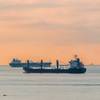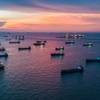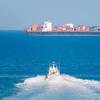Indonesia renamed the northern reaches of its exclusive economic zone in the South China Sea as the North Natuna Sea on Friday, the latest act of resistance by Southeast Asian nations to China's territorial ambitions in the maritime region.
Seen by analysts as an assertion of Indonesian sovereignty, part of the renamed sea is claimed by China under its contentious maritime boundary, known as the 'nine-dash line', that encompasses most of the resource-rich sea.
Several Southeast Asian states dispute China's territorial claims and are competing with China to exploit the South China Sea's abundant hydrocarbon and fishing resources. China has raised the ante by deploying military assets on artificial islands constructed on shoals and reefs in disputed parts of the sea.
Indonesia insists it's a non-claimant state in the South China Sea dispute but has clashed with China over fishing rights around the Natuna Islands, detaining Chinese fishermen and expanding its military presence in the area over the past 18 months.
Unveiling the new official map, the deputy of maritime sovereignty at the Ministry of Maritime Affairs, Arif Havas Oegroseno, noted the northern side of its exclusive economic zone was the site of oil and gas activity.
"We want to update the naming of the sea we gave a new name in line with the usual practice: the North Natuna Sea," he told reporters.
In Beijing, Chinese Foreign Ministry spokesman Geng Shuang said he didn't know anything about the details of the issue, but said the name South China Sea had broad international recognition and clear geographic limits.
"Certain countries' so-called renaming is totally meaningless," he told a daily news briefing. "We hope the relevant country can meet China halfway and properly maintain the present good situation in the South China Sea region, which has not come easily."
'CLEAR MESSAGE'
I Made Andi Arsana, an expert on the Law of the Sea from Indonesia's Universitas Gadjah Mada, said the renaming carried no legal force but was a political and diplomatic statement.
"It will be seen as a big step by Indonesia to state its sovereignty," he told Reuters. "It will send a clear message, both to the Indonesian people and diplomatically speaking."
Euan Graham, director of the international security program at the Lowy Institute, said Indonesia's action followed renewed resistance to Chinese territorial claims by other Southeast Asian states. "This will be noticed in Beijing," he said.
Last week, Vietnam extended an Indian oil concession off its coast while a joint venture led by state-owned PetroVietnam commenced drilling further south. China has a territorial claim in both areas.
Meanwhile, the director of the Philippines Energy Resource Development Bureau, Ismael Ocampo, said on Wednesday that the country could lift a suspension on oil and gas drilling on the Reed Bank by December. The underwater mountain, lying 85 nautical miles off the Philippines coast, is also claimed by China.
Exploration activity was suspended in late 2014 as the Philippines sought an international ruling on China's territorial claim. The Philippines won the case in the Permanent Court of Arbitration in the Hague one year ago.
China refused to recognize the decision. Philippines President Rodrigo Duterte, who took office on June 30 last year, expressed reluctance about enforcing the decision at the time, as he sought deeper diplomatic and economic ties with China.
However, the Philippines lately has become more assertive about its sovereignty.
More than two dozen oil, gas and coal blocks, including additional areas in disputed waters, may be offered during the December bidding, Ocampo said on Wednesday.
(Reporting by Tom Allard and Bernadette Christina Munthe; Additional reporting by Ben Blanchard in Beijing; Editing by Bill Tarrant)













